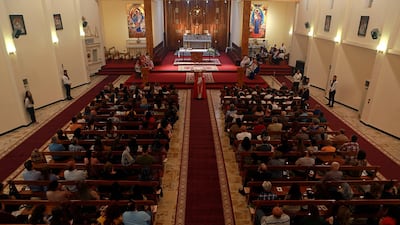Thousands of Iraqi Christians celebrated Easter weekend across the country on Sunday as they try to rebuild their lives two years after the end of the brutal rule of ISIS that threatened to end 2,000-years of history.
Iraq declared victory over ISIS in 2017 and the country began to try and pick up the pieces left by the brutal three-year rule of the terror group over several major cities. Although many Christians remain in the autonomous Kurdish north-western region, a steady stream of those displaced from their homes by the extremist group that brutally killed minorities caught living under its rule.
On returning home, they have found churches looted or destroyed and homes ruined. But this year, those who have gone back are optimistic.
"I expect a large number of people to attend Easter mass – relative to the number of Christians which are still left in Iraq," Zina Kiryakos, herself an Iraqi Chaldean Christian and the president of the Iraqi Christian Foundation, told The National. "Easter is the most important day or holiday of the year for Iraqi Christians and almost all of the community attends mass during Easter."
For centuries, Iraq has been home to a variety of Christian denominations, a representation of the country’s religious and ethnic diversity.
“Easter Sunday will be similar to Palm Sunday were thousands upon thousands of Christians took to the streets of the Syriac Christian town of Qaraqosh, Iraq, for mass,” Ms Kiryakos said.
Qaraqosh, like many other Christian towns across northern Iraq, was overrun by insurgents in 2014, forcing hundreds of thousands of Christians and other religious minorities to flee.
Around a third of the pre-2014 population has returned to the town so far, Elizabeth Tsurkov, a research fellow at the Forum for Regional Thinking, said.
But politicians in Baghdad are vowing to rebuild Christian areas that were destroyed by the war.
“On this day we remember the plight of Iraqi Christians who endured the vile onslaught of terrorists and extremists. We must – and will – commit to rebuilding their areas and the surrounding environs so they can live in freedom, peace and prosperity,” Iraqi President Barham Salih said on Twitter.
"We are calling on God to ensure that our Christian brothers and beloved Iraq to remain safe and united, regardless of religion, ethnicity or sect," Alia Al Emara, an Iraqi politician told The National.
During its three-year rule, ISIS targeted religious groups living under its rule, and inflicted harsh punishment on Sunnis who refused to abide by its extreme interpretation of Islam.
Christians were given an ultimatum to either pay tax, convert to Islam, or die.
In the carnage in the years after the 2003 US-led invasion of Iraq and the 2014 invasion by ISIS, the Christian community has shrunk from around 1.5 million to just 400,000 in 16 years.
The damage done to Christian communities across the Nineveh Plains, east of Mosul, after their capture by ISIS has been so extensive that it has become for minorities to return.
But Ms Kiryakos said that Christians in Iraq will not let the suffering they’ve endured to stop them from celebrating Easter.
“Iraqi Christians are very spiritual with a strong faith, so they are always filled with joy and happiness during Easter,” she said.
At the St Joseph Chaldean Church in Baghdad, hundreds of worshippers attended an Easter mass on Saturday night praying, singing and rejoicing.
Security concerns
Security continues to be the key issue for Christians in Iraq, with the fall of ISIS, a different group is now taking its place – the Iranian-backed militias.
The militias, also known as Hashed Al Shaabi, were mobilised to fight ISIS. But since the fall of the militants, they have entrenched their presence on the ground and taken over the liberated towns of Qaraqosh and Bartella, and the Chaldean town of Karemlash in Eastern Mosul, Ms Kiryakos said.
"I have been informed that US officials are pushing Iraq to allow Christians in the Nineveh Plains to have their own local police/guards [under the authority of the Central Baghdad government]," she said.
The militias are trying to take over the Nineveh Plains to make a road for themselves from Iran to Lebanon, passing through Iraq and Syria, Ms Kiryakos said.
In addition to the security concerns, Christians are also struggling to find employment and she said many feel they are treated as "second class citizens" because of their faith.
"There's still fear ingrained in us, and no stability," said Michael Hanaa, an Iraqi Christian living in Mosul.


